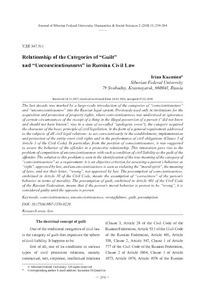Показать сокращенную информацию
Relationship of the Categories of “Guilt” and “Unconscientiousness” in Russian Civil Law
| Автор | Kuzmina, Irina | en |
| Автор | Кузьмина, И. | ru_RU |
| Дата внесения | 2018-02-28T07:30:12Z | |
| Дата, когда ресурс стал доступен | 2018-02-28T07:30:12Z | |
| Дата публикации | 2018-02 | |
| URI (для ссылок/цитирований) | https://elib.sfu-kras.ru/handle/2311/70373 | |
| Аннотация | The last decade was marked by a large-scale introduction of the categories of “conscientiousness” and “unconscientiousness” into the Russian legal system. Previously used only in institutions for the acquisition and protection of property rights, where conscientiousness was understood as ignorance of certain circumstances of the receipt of a thing in the illegal possession of a person (“did not know and should not have known”, was in a state of so-called “apologetic error”), the category acquired the character of the basic principle of civil legislation, in the form of a general requirement addressed to the subjects of all civil legal relations: to act conscientiously in the establishment, implementation and protection of the entity overt civil rights and in the performance of civil obligations (Clause 3 of Article 1 of the Civil Code). In particular, from the position of conscientiousness, it was suggested to assess the behavior of the offender in a protective relationship. This innovation gave rise to the problem of competition of unconscientiousness with such a condition of civil liability as the guilt of the offender. The solution to this problem is seen in the identification of the true meaning of the category of “conscientiousness” as a requirement: it is an objective criterion for assessing a person’s behavior as “right”, approved by law, and unconscientiousness is seen as violating the “moral spirit”, the meaning of laws, and not their letter, “wrong”, not approved by law. The presumption of conscientiousness, enshrined in Article 10 of the Civil Code, means the assumption of “correctness” of the person’s behavior in terms of morality. The presumption of guilt, enshrined in Article 401 of the Civil Code of the Russian Federation, means that if the person’s moral behavior is proven to be “wrong”, it is considered guilty until the opposite is proven | en |
| Аннотация | Последнее десятилетие ознаменовалось масштабным внедрением в российскую правовую систему категорий «добросовестность» и «недобросовестность». Используемая ранее исключительно в институтах приобретения и защиты вещных прав, где добросовестность понималась как незнание о некоторых обстоятельствах поступления вещи в незаконное владение лица («не знал и не должен был знать», находился в состоянии так называемого извинительного заблуждения), указанная категория приобрела характер основного начала гражданского законодательства в виде общего требования, обращенного к субъектам всех гражданских правоотношений: действовать добросовестно при установлении, осуществлении и защите субъективных гражданских прав и при исполнении гражданских обязанностей (п. 3 ст. 1 ГК РФ). В частности, с позиции добросовестности было предложено оценивать поведение нарушителя в охранительных отношениях. Данное нововведение породило проблему конкуренции недобросовестности с таким условием гражданско-правовой ответственности, как вина нарушителя. Решение этой проблемы усматривается в выявлении истинного значения категории добросовестности в качестве требования: она представляется объективным критерием оценки поведения лица как «правильного», одобряемого правом, а недобросовестность – в качестве нарушившего «нравственный дух», смысл законов, а не их букву, «неправильного», не одобряемого правом. Презумпция добросовестности, закрепленная в ст. 10 ГК РФ, означает предположение о «правильности» поведения лица с точки зрения нравственности. Презумпция виновности, закрепленная в ст. 401 ГК РФ, означает, что при доказанности «неправильного» поведения лица с точки зрения нравственности, оно считается виновным, пока не доказано обратное | ru_RU |
| Язык | en | en |
| Издатель | Сибирский федеральный университет. Siberian Federal University | en |
| Тема | conscientiousness | en |
| Тема | unconscientiousness | en |
| Тема | wrongfulness | en |
| Тема | guilt | en |
| Тема | presumption | en |
| Тема | добросовестность | ru_RU |
| Тема | недобросовестность | ru_RU |
| Тема | противоправность | ru_RU |
| Тема | вина | ru_RU |
| Тема | презумпция | ru_RU |
| Название | Relationship of the Categories of “Guilt” and “Unconscientiousness” in Russian Civil Law | en |
| Альтернативное название | Соотношение категорий «вина» и «недобросовестность» в российском гражданском праве | ru_RU |
| Тип | Journal Article | en |
| Контакты автора | Kuzmina, Irina:Siberian Federal University 79 Svobodny, Krasnoyarsk, 660041, Russia; kuzmina-58@mail.ru | en |
| Контакты автора | Кузьмина, И.: Сибирский федеральный университет Россия, 660041, Красноярск, пр. Свободный, 79 | ru_RU |
| Страницы | 254-264 | ru_RU |
| Журнал | Журнал Сибирского федерального университета. Гуманитарные науки. Journal of Siberian Federal University. Humanities & Social Sciences;2018 11 (2) | en |

